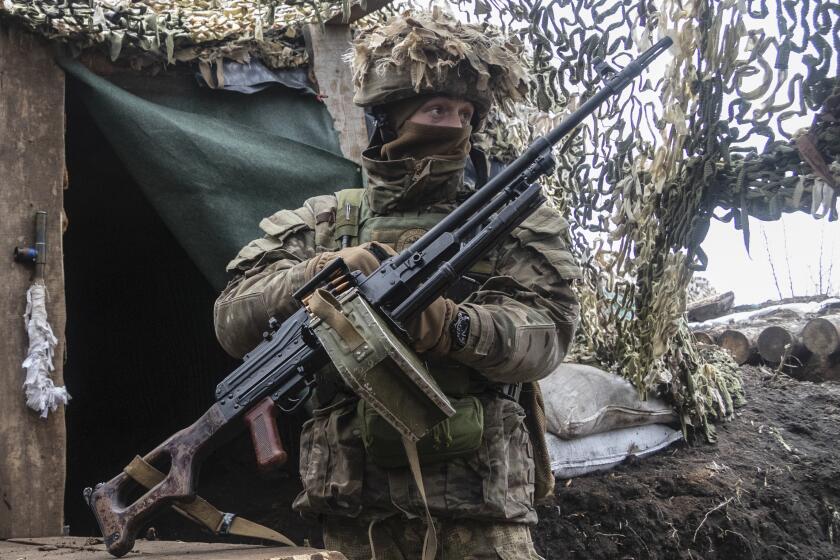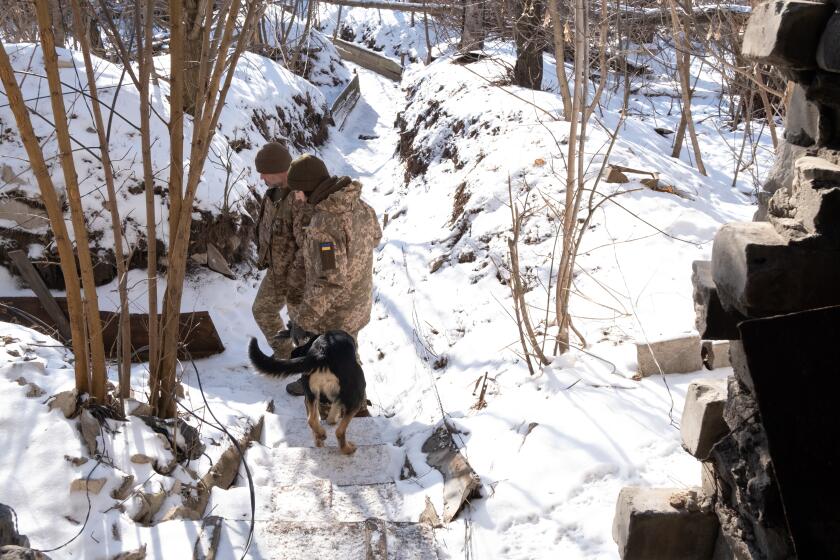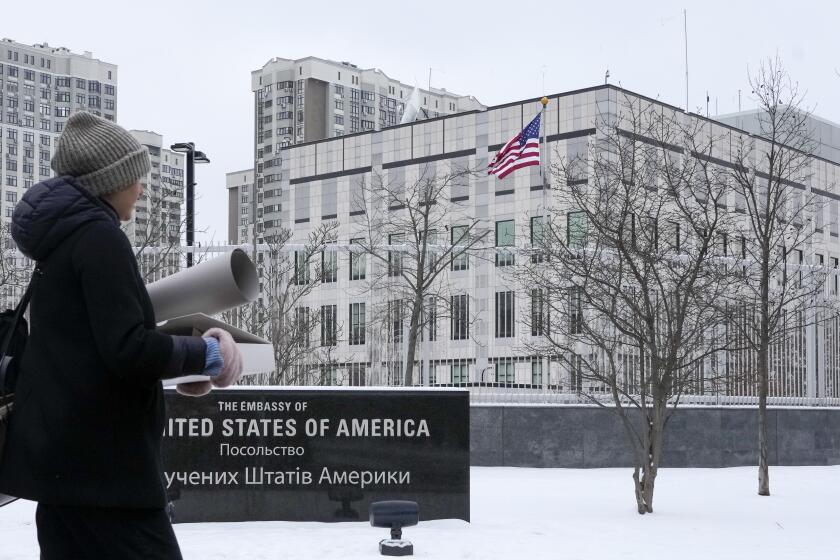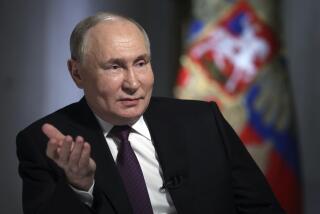Russia insists it won’t start a war as Biden warns otherwise
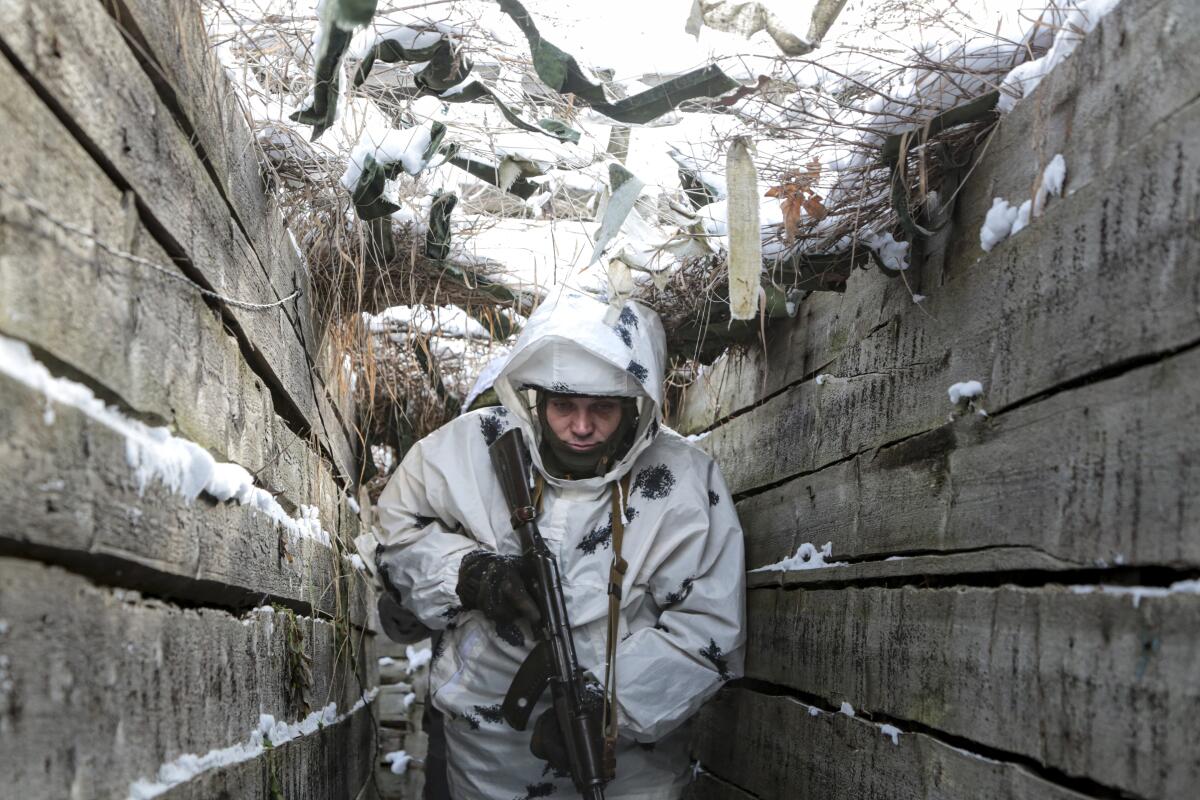
- Share via
MOSCOW — Russia said Friday that it would not start a war in Ukraine but warned that the U.S. and NATO have ignored its demands and left little room for compromise in the crisis.
President Vladimir Putin told French President Emmanuel Macron that the West had failed to consider Russia’s key conditions of halting further NATO expansion, stopping deployment of the alliance’s weapons near Russian borders and rolling back its forces from Eastern Europe, the Kremlin said.
The U.S. and NATO formally rejected those demands this week, although Washington outlined areas where discussions are possible, offering hope that there could be a way to avoid war amid the buildup of more than 100,000 Russian troops near Ukraine.
Despite that, President Biden on Thursday warned Ukraine’s leader of the “distinct possibility” that Russia could take military action against the former Soviet state in February. Russia has repeatedly denied having any such plans.
Putin told Macron that Moscow would study the U.S. and NATO response before deciding its next move, according to a Kremlin account of their call. Earlier in the day, Putin held a weekly meeting of his Security Council, saying only that it would address foreign policy issues.
Putin has made no public remarks about the Western response to Russia’s demands, but Foreign Minister Sergey Lavrov said it left little chance for reaching agreement.
Ukraine’s leaders are seeking to reassure their jittery citizens that an invasion from neighboring Russia is not imminent, despite a troop buildup.
“While they say they won’t change their positions, we won’t change ours,” Lavrov told Russian radio stations in a live interview. “I don’t see any room for compromise here....
“There won’t be a war as far as it depends on the Russian Federation — we don’t want a war,” he added. “But we won’t let our interests be rudely trampled on and ignored.”
Lavrov said the U.S. had suggested the two sides could talk about limits on the deployment of intermediate-range missiles, restrictions on military drills and rules to prevent accidents between warships and aircraft. He said that Russia proposed discussing those issues years ago but Washington and its allies never took up the offer until now.
While welcoming Washington’s offers on confidence-building measures, Lavrov argued that they were secondary to Russia’s main concerns over NATO. He noted that international agreements say the security of one nation must not come at the expense of others — and that he would send letters to ask his Western counterparts to explain their failure to respect that pledge.
“It will be hard for them to wiggle out from answering why they aren’t fulfilling the obligations sealed by their leaders not to strengthen their security at the expense of others,” he said, referring to a document signed at a 1999 summit of the Organization for Security and Cooperation in Europe.
Washington has warned Moscow of devastating sanctions if it invades Ukraine, including penalties targeting top Russian officials and key economic sectors. Asked about possible sanctions, Lavrov said Moscow had told Washington that their introduction would amount to a complete severing of ties.
While Moscow and the West mull their next steps, NATO said it was bolstering its deterrence in the Baltic Sea region, and the U.S. ordered 8,500 troops on higher alert for potential deployment to Europe.
Russia has launched military drills involving motorized infantry and artillery units in southwestern Russia, warplanes in Kaliningrad on the Baltic Sea and dozens of warships in the Black Sea and the Arctic. Russian troops have also headed to Belarus for sweeping joint drills, raising Western fears that Moscow could stage an attack on Ukraine from the north. Kyiv, the Ukrainian capital, is just 50 miles from the border with Belarus.
Slog of trench warfare in eastern Ukraine yields scenes reminiscent of World War I.
Belarusian President Alexander Lukashenko said there would be no war unless Belarus or Russia came under attack, and accused the West of trying to “drown our Slavic brotherhood in blood.”
“The leaders of some countries have gone mad. They think they can win that war,” he said. “But there will be no victory. We will all lose.”
Despite the alarming rhetoric, Ukrainian officials have repeatedly tried to project calm.
Ukrainian President Volodymyr Zelensky downplayed Western warnings of an imminent Russian invasion, saying at a news conference Friday that they created panic among investors in the country’s financial markets.
The financial options under consideration to punish President Vladimir Putin if Russia invades Ukraine range from the sweeping to the personal.
Defense Minister Oleksii Reznikov told parliament that the number of Russian troops near Ukraine — about 130,000 — was comparable to a military buildup last spring, which eventually ended after Moscow pulled its forces back after massive exercises.
“We haven’t observed any events or actions of military character that significantly differ from what was going on last spring,” with the exception of the deployment to Belarus, Reznikov said.
Ukraine already is beset by conflict. Following the 2014 ouster of a Kremlin-friendly president in Kyiv, Moscow annexed Ukraine’s Crimean peninsula and backed an insurgency in the country’s eastern industrial heartland. Fighting between Ukrainian forces and Russia-backed rebels has killed more than 14,000 people, and efforts to reach a settlement have stalled.
During Friday’s call with Macron, Putin spoke in favor of continuing talks among Russia, Ukraine, France and Germany on a stalled peace agreement for eastern Ukraine. Presidential envoys from the four countries met Wednesday in Paris and agreed to another meeting in Berlin in two weeks.
A French official described the conversation between Putin and Macron as a serious and respectful one that spoke of “the necessity of de-escalation.” The Russian leader made no concessions, according to the official, who spoke on condition of anonymity to describe the conversation.
More to Read
Sign up for Essential California
The most important California stories and recommendations in your inbox every morning.
You may occasionally receive promotional content from the Los Angeles Times.
